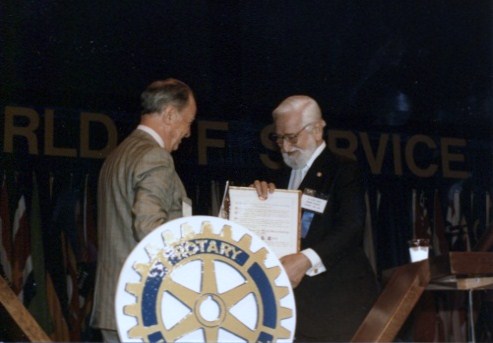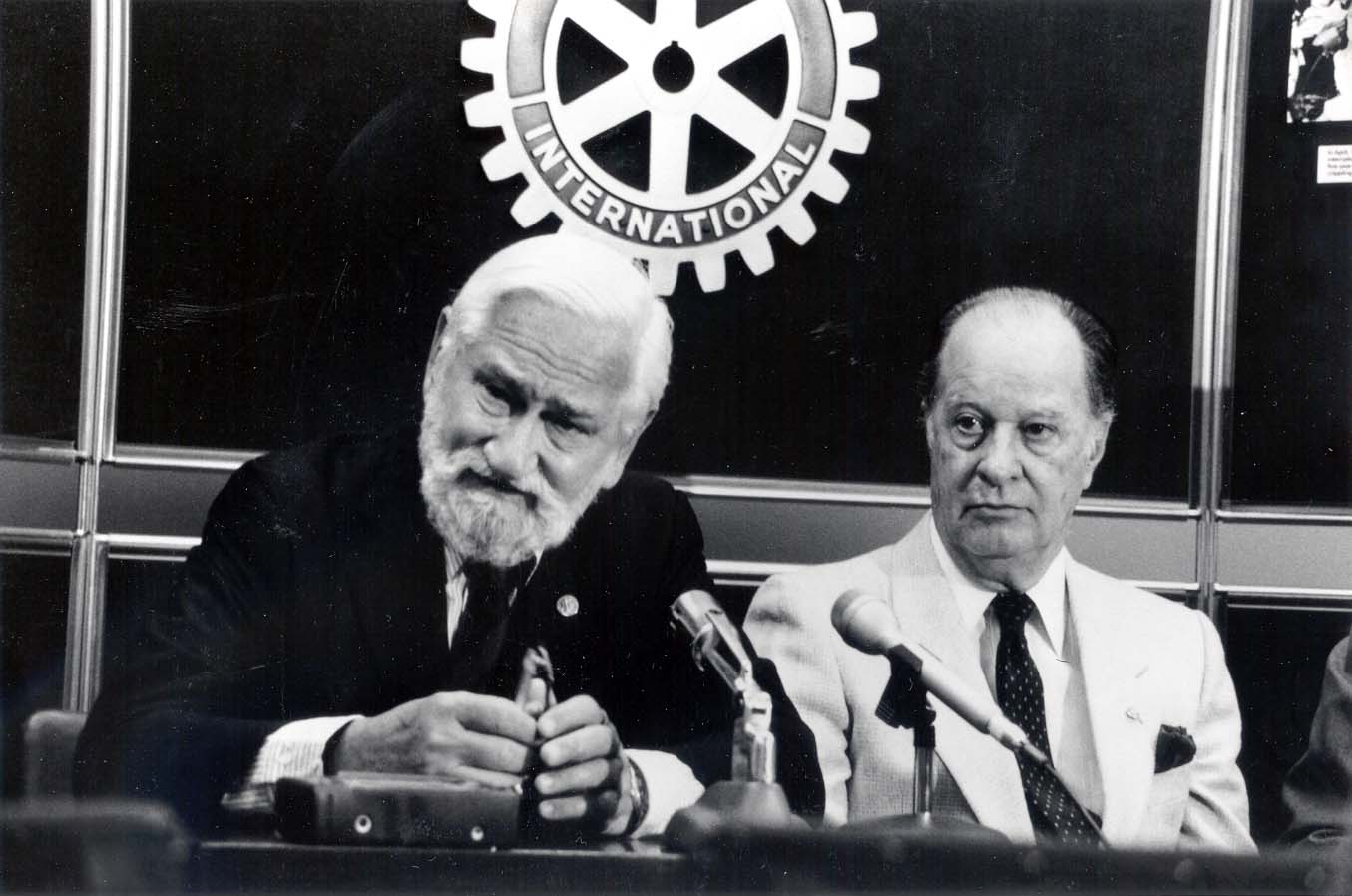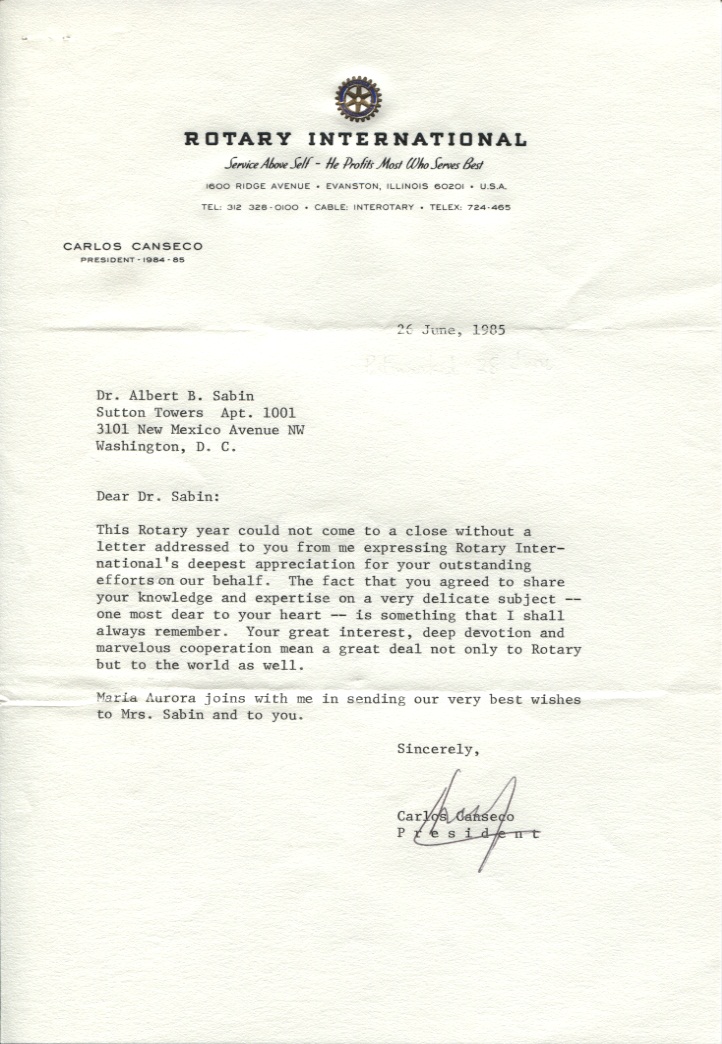
Found in the Sabin Archives - Dr. Sabin receives “Rotary Award for World Understanding” at the 1985 RI Convention in Kansas City, Missouri.
October 24 is World Polio Day, which is sponsored by Rotary International. Since 1985, with the implementation of the PolioPlus program, this organization has been working to end polio throughout the world. As I had mentioned in my first blog post, there are only four countries in the whole world – Afghanistan, India, Nigeria and Pakistan – where polio is still considered “endemic.” Due to the massive effort of Rotary International and its partners, through the Global Polio Eradication Initiative, less than 1,700 polio cases were reported in 2009. World Polio Day is an effort to bring attention to the fight against polio. Rotary International’s “End Polio Now” website states, “As long as polio threatens even one child anywhere in the world, children everywhere remain at risk.”
I wanted to share a little bit about the relationship between Dr. Sabin and Rotary International. Dr. Sabin had a role in the Rotary International’s Polio 2005 program (which was later renamed the PolioPlus program). He was an advisor for the Polio 2005 Committee, developing a proposal that would implement national polio vaccination days in developing countries, in hopes of eliminating the disease. Because of his work on the Polio 2005 Committee, Dr. Sabin was honored with the “Rotary Award for World Understanding” at the 1985 Rotary International Convention in Kansas City, Missouri. After his introduction by Rotary International President Carlos Canseco, Dr. Sabin took the stage to address the crowd. He described many of the efforts to eradicate polio throughout the world, emphasizing cooperation and understanding. He ended his speech by urging Rotarians to help other countries stop the spread of polio by saying, “I hope you will dedicate yourself to the true glory- to continue to work until your worthy objectives will be achieved.” Because of this award, Dr. Sabin was also featured in The Rotarian, which is Rotary International’s magazine (see citation below). In this article, Dr. Sabin urged the “rapid elimination and continuing control of polio in developing countries.” He stressed, “Most important, we have the ability to control a disease like polio right now.”

In 1985, Dr. Sabin and RI President Carlos Canseco announced the Polio 2005 plan at a press conference. (Photo Credit: Ron Crumley/Rotary International. © Rotary International. Reproduced with permission.)
After the convention in Kansas City, the “PolioPlus” program was launched, where Rotarians contribute to the cause through volunteering and fundraising. In 1988, the World Health Organization, the United States Centers for Disease Control and Prevention, and the United Nations Children’s Fund joined forces with Rotary International to form the Global Polio Eradication Initiative, with the goal to live in a polio-free world.
Over 25 years later, Dr. Sabin’s oral polio vaccine “remains the vaccine of choice in routine immunization schedules and supplementary immunization activities,” according to the Global Polio Eradication Initiative. Because the oral polio vaccine is inexpensive, easy to administer, provides immunity to three strains of polio, and provides passive immunization, it is still used today in the fight to eradicate polio.
Be on the lookout for more blog posts about the relationship between Dr. Sabin and Rotary International, particularly his involvement with the Rotary Club of Cincinnati.
Notes: First, I would like to thank Susan Hanf from Rotary International’s History and Archives, who provided me with valuable information about the connection between Dr. Sabin and RI. Secondly, the Hauck Center for the Albert Sabin Archives has some material from Dr. Sabin’s time as advisor for the Polio 2005 Committee. Two folders on Rotary International can be found in Series #7 – Oral Polio Vaccine, one is located in Series #9 – Poliomyelitis, and a fourth can be found in Series #11 – Professional and Personal Engagements. Finally, the article in The Rotarian that is mentioned above is called “Dr. Albert Sabin – Master of Medicine” by Cary Silver (June 1986, pages 26-29 and 59.)
In 2010, the University of Cincinnati Libraries received a $314,258 grant from the National Endowment for the Humanities (NEH) to digitize the correspondence and photographs of Dr. Albert B. Sabin. This digitization project has been designated a NEH “We the People” project, an initiative to encourage and strengthen the teaching, study, and understanding of American history and culture through the support of projects that explore significant events and themes in our nation’s history and culture and that advance knowledge of the principles that define America. Any views, findings, conclusions, or recommendations expressed in this blog do not necessarily reflect those of the National Endowment for the Humanities.

